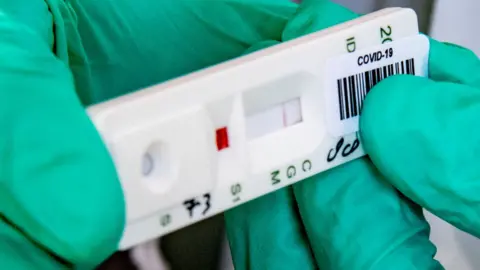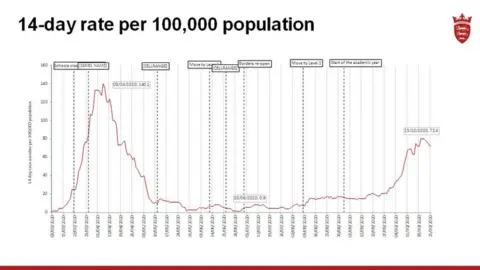Covid-19: Jersey announces winter strategy against virus
 Getty Images
Getty ImagesThe Government of Jersey has released an updated strategy on how it intends to deal with coronavirus during the winter months.
The report outlines eight main actions that aim to suppress levels of the virus and avoid another lockdown.
Under the new plans frontline healthcare workers will be tested every four weeks, the government said.
Other steps include increased on-island testing for wider workforces and higher rates of flu vaccination.
Health Minister Deputy Richard Renouf said rising levels of infection in the UK and "across Europe" showed the virus remained a "significant challenge" as the island moves into winter.
"Our key principle over the winter will be to target our response to Covid-19, and avoid if possible, having to bring in blanket restrictions."
Eight priorities identified by the report include:
- Increasing on-island testing
- Updating travel classifications of countries and regions
- Mask policies for indoor public spaces
- Shielding programmes for high risk islanders
- Vaccinating for flu and, when possible, Covid-19
- Ensuring government is prepared
- Flexible to escalate, but using the 'least overall harm' principle
- Communication about sensible behaviour, backed with enforcement
 Government of Jersey
Government of JerseyUnder the new testing regime, the government said it aimed to test 75% of its 4,000 frontline healthcare workers in each monthly cycle.
A range of professions "with close contact with vulnerable people", such as GPs and home carers, would also be tested every six weeks.
In addition all workers with "close customer contact", making up about 60% of Jersey's workforce, would be subject to "risk-based" testing.
The island's Scientific and Advisory Cell (STAC) said colder weather would increase the risk of on-island transmission and apply further pressure to healthcare services.
Deputy Renouf said he was "determined" to maintain "the health, wellbeing and livelihoods of Jersey and its people".
